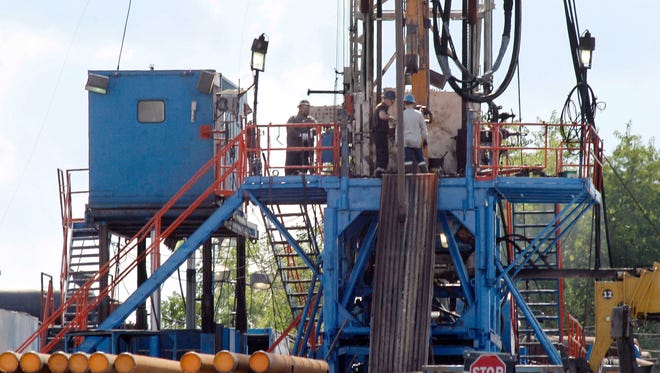Obama administration unveils new fracking rules

The Obama administration said Friday it is tightening rules on fracking with regulations that it says will preserve the oil and gas extraction method while protecting water supplies and the environment.
The new rules, which take effect in June, require oil and gas companies to disclose the chemicals they use in hydraulic fracturing and to build large barriers to shield nearby water sources.
Environmental groups complimented the new rules on fracking, though some said the administration should simply ban the practice.
Members and supporters of the oil and gas industries denounced the new regulations and said they will damage a booming energy industry. Some immediately filed suit against the administration.
In announcing the new rules, Interior Secretary Sally Jewell said current well-drilling regulations are more than 30 years old, "and they simply have not kept pace with the technical complexities of today's hydraulic fracturing operations."
The new rules provide "a framework of safeguards and disclosure protocols that will allow for the continued responsible development of our federal oil and gas resources," Jewell said.
Industry groups immediately filed suit against the new regulations, calling them an overreaction to unsubstantiated environmental concerns about fracking.
"At a time when the oil and natural gas industry faces incredible cost uncertainties, these so-called baseline standards will threaten America's economic upturn, while further deterring energy development on federal lands," said Barry Russell, president and CEO of the Independent Petroleum Association of America.
Republican members of Congress also denounced the new regs. Rep. Steve Scalise, R-La., said they "represent yet another attack on American jobs by President Obama, and continue his attack on American-made energy."
Environmentalists called fracking a dangerous process that threatens air and water quality and may even trigger earthquakes.
Dan Chu, senior director for the Sierra Club's Our Wild America Campaign, said the new rules "represent important progress," but "the only true way to protect communities from fracking is to not frack at all."
Said Chu: "Even as the Obama administration works to lessen the harmful consequences of current development, they can advance the clean energy growth noted by Secretary Jewell, reduce the climate impact of new mining and drilling and protect public lands by making sure dirty fuels stay in the ground."
Fracking involves pumping huge volumes of water, sand and chemicals underground to split open rocks to allow oil and gas to flow. While technology improvements have opened new sources of oil and gas across the country, critics have also pointed to evidence of groundwater contamination and an increase in earthquakes.
There are more than 100,000 oil and gas wells on federally managed lands, the Interior Department reported. Of wells currently being drilled, more than 90% use hydraulic fracturing.
"The rule applies only to development on public and tribal lands and includes a process so that states and tribes may request variances from provisions for which they have an equal or more protective regulation in place," the Interior Department said in a statement.
Among the new rules, according to the Interior Department:
• "Provisions for ensuring the protection of groundwater supplies by requiring a validation of well integrity and strong cement barriers between the wellbore and water zones through which the wellbore passes;
• "Increased transparency by requiring companies to publicly disclose chemicals used in hydraulic fracturing to the Bureau of Land Management through the website FracFocus, within 30 days of completing fracturing operations;
• "Higher standards for interim storage of recovered waste fluids from hydraulic fracturing to mitigate risks to air, water and wildlife,
• "Measures to lower the risk of cross-well contamination with chemicals and fluids used in the fracturing operation, by requiring companies to submit more detailed information on the geology, depth, and location of preexisting wells to afford the BLM an opportunity to better evaluate and manage unique site characteristics."